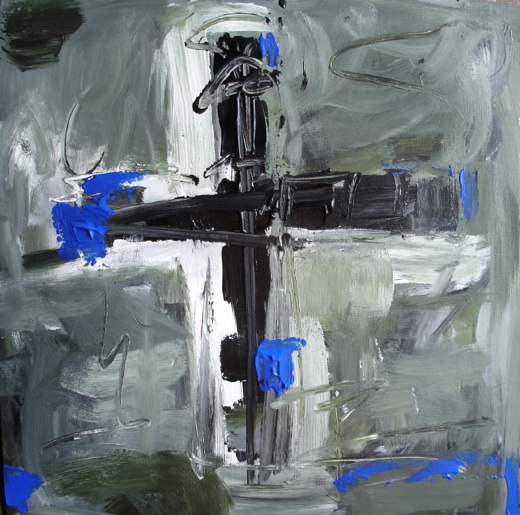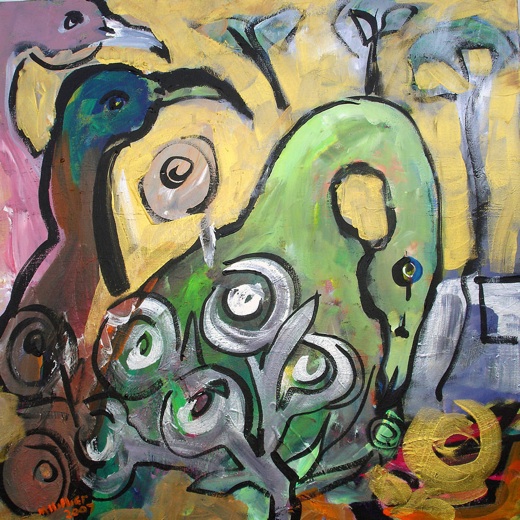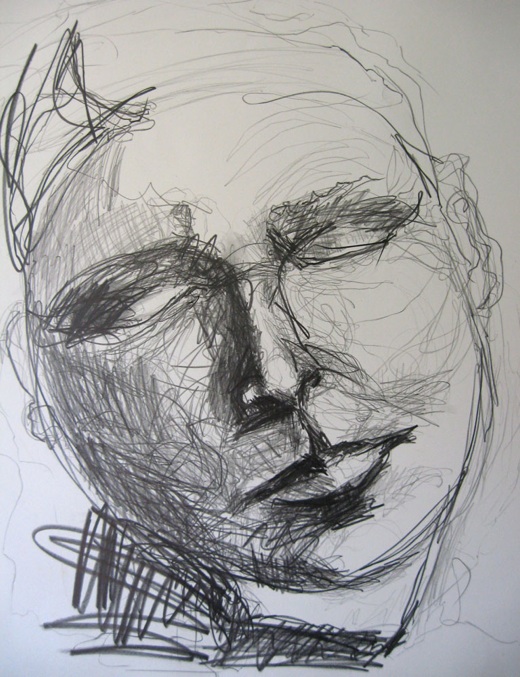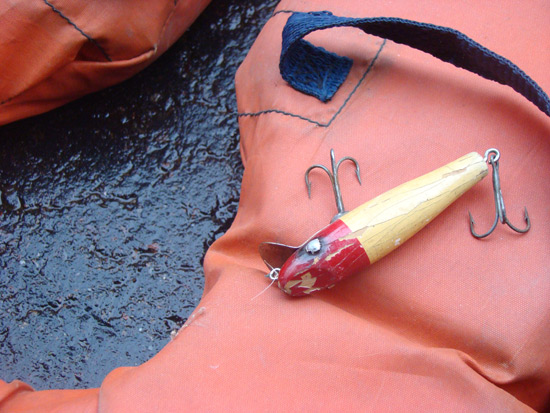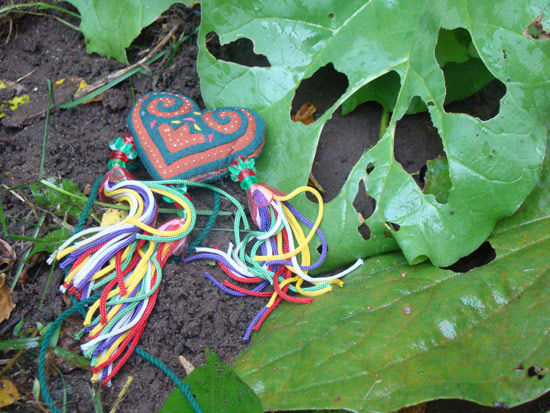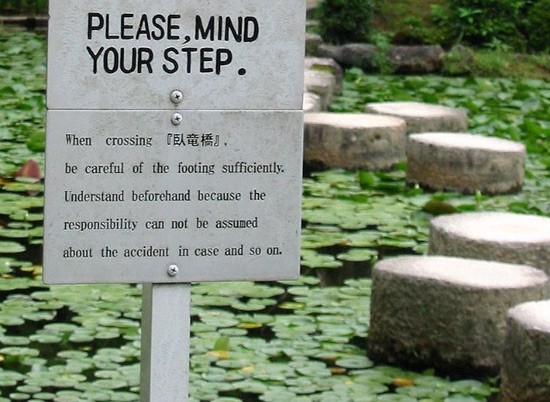
Fujimore was an engineer at CHB Nagasaki for eight years before he wandered up to the banks of that stream. It had been redirected through a large tunnel under the highway. When he saw this, a hundred yards up, Fujimore thought, “I have finally reached the end of the line.” Because there was no bridge to cross, and the highway was treacherous.
His reflexes were no good after eight years of office work, so he didn’t trust himself to the shoulder of the busy road, in case he might need to jump sharply out of the way. Yet, because he hesitated a bit longer, wandering closer to the water, he saw that there was — almost — a path of rocks he could use, stepping one by one, to cross it. And, for an engineer, this problem of approximating the adequate surface areas and slickness coefficient of each rock was much like what might happen if an autistic child wandered past one of those jars full of gumballs, the kind where customers are encouraged to guess how many gumballs there are in the jar.
After a taciturn series of calculations, Fujimore gambled that if he took his first step onto the large brown rock, with his right foot, then he might just make it. He looked up to the sun, which was still far from the peak of its daily arc, adjusting the glasses he wore, and then he took the first step.
His foot landed squarely on the rock, it did not slide, and he felt he could almost certainly chart the high curve of torsion before it might even begin to slip as well. He made it to the second, and the third; and soon he was standing above the cool rushing water, which was brown from the mud because it was the rainy season, and going back was not an option anymore.
His legs got a little rubbery at the thought; but he had only to step from this rock with his right, and then to that one with his left, and so on, until he reached the other side. Or was it this rock with his left?
His feet were equally balanced, directly underneath him on two parallel rocks, and after all this deliberation he had forgotten with which foot he’d taken his last step. He led with his left for an agglomeration of reasons only a man of algorithms would understand; and now, with his feet respectively pointed north by north-west, he saw only a better step with his left foot and nothing for his right.
To lead, again, with his left would put him that much more at an angle, which was at the very least a good stretch for him. The water continued unperturbed beneath him. If he wanted to look to it for help, he knew its answer would be cold and maybe precipitous even, with these rocks to worry about.
On the other side of the stream, from the direction of the highway, Fujimore saw two fishermen approaching down a dirt path. One was a squat man, who brought up the rear, steadily plugging away down the middle of the trail, “Like a tuba,” Fujimore thought. He could almost hear the polka music coming from his parent’s old phonograph from the way the man stepped. The tuba’s skinny partner trumpeted ahead, back and forth across the path, racing down the steep grades, only to wait for his friend at the corners.
They walked along the bank, and stopped maybe twenty feet to the right of where Fujimore would be whenever he made it to the other side. They still hadn’t noticed him. The tuba said, “Kyoo wa takusan de sakana. Wakarimasu.” There will be many fish today. His sharp, expert eyes gauged the opaque water for the fish which always spilled out from the pipe, especially during the floods. He didn’t have to see them to know today would be an excellent day. The skinny trumpet had set down his tackle box, unpacking it, while he nodded his head in agreement, saying, “Kore wa tsutomete.” We work for this.
The fat man laughed. And, yes, Fujimore knew he was right. He had to not forget that he was stuck on the rocks though. “Ohhhh,” the fat man said, noticing him. “Who is that there?” he asked.
“Just Fujimore,” he said.
“Oh,” the tuba answered. “Well, what are you doing in the middle of that stream there, then, Fujimore?”
“I had to cross somehow.”
“Well, how did you get across before?” the tuba asked, apparently believing theirs was the only way. Fujimore told him, “I come from Urakami.” And now the fat man understood, since that was quite a ways in the other direction.
By now the skinnier man had stood back up again, and he was looking at Fujimore too, “So you just have to put one foot in front of the other,” he declared.
“Ah,” Fujimore said, relaxing then flexing the arches of his feet, “But just now I feel like I’ve realized something.”
“What’s that?” asked the tuba.
“That, somehow, it’s quite a metaphor for life out here,” Fujimore said.
“Quite a what?” the trumpet snapped. But the tuba man, in low tones, must have assured him what it was, for he said afterward, “Oh, what, because you’re stuck in a stream?”
“It’s because of my feet,” Fujimore said. Fujimore and the fishermen all looked as he explained. “There’s not a good way to step clearly across for my right foot. So I have to either back up, which is not as easy as it looks, or bring this right one up on the same rock as my left.”
“Ohhhh,” the two men said together.
After about an hour of no bites, and no movement on Fujimore’s part, the skinnier one looked out across the water and wryly asked the engineer: “Still haven’t moved?”
“I was thinking about it,” Fujimore said — which struck him, strangely, as the most oddly balanced thing he’d ever said, in light of his standing between two rocks. “But I really am quite relaxed out here,” Fujimore told them. “It’s surprising, but true.”
“Then you’ve found a bit of solitude out there, so be it,” the fat man answered. Fujimore noticed that he toasted him with a small glass of sake that he had not seen him take out and fill. “Perhaps,” Fujimore thought, “he has had a few already by the sound of it.”
“But don’t think you can spend your whole life in the middle of stream, Fujimore,” the fat man said. He and his partner toasted, and a few minutes later the trumpet had a bite on the end of his line. From his unique vantage point in the middle of the stream Fujimore watched them struggle with the foot long Namazu, hauling it up, careful not to touch the barbs on its cheeks; and he was happy to feel like the stream, and he too, could provide some sustenance, be it for the belly or the mind. But she had never wanted that.
Another hour later, Fujimore’s legs had steeled themselves so that he hardly felt the passage of time anymore. He was amazed to feel, almost, more firmly balanced than he had been, instead of weaker. The fishermen began to pack up their things. The sake was gone, and they hadn’t had a bite since catching that first Namazu. Before leaving, the bigger man turned around, a frown grazing his face for a moment as he contemplated this poor youth in the middle of the stream. “You think you can handle it from here?” he asked. It was a piteous way to summarize all the things he wanted to say, but so be it.
“Hai,” Fujimore said, “Kore wa tsutomemasu, desu ne?” We work for this, right?
“Hai,” said the tuba.
The skinny man carried the fish at his side in its plastic bucket of water, slung through its gills to a metal chain but still alive. Balanced on the rocks, which bit into his feet now, Fujimore thought, “It is just like that chain must feel for the fish.” And maybe twenty minutes later, in the delirious afternoon sun, he lost his balance and fell into the water.
B. Tyler Burton
Dear Reader,
In The Fray is a nonprofit staffed by volunteers. If you liked this piece, could you
please donate $10? If you want to help, you can also:
